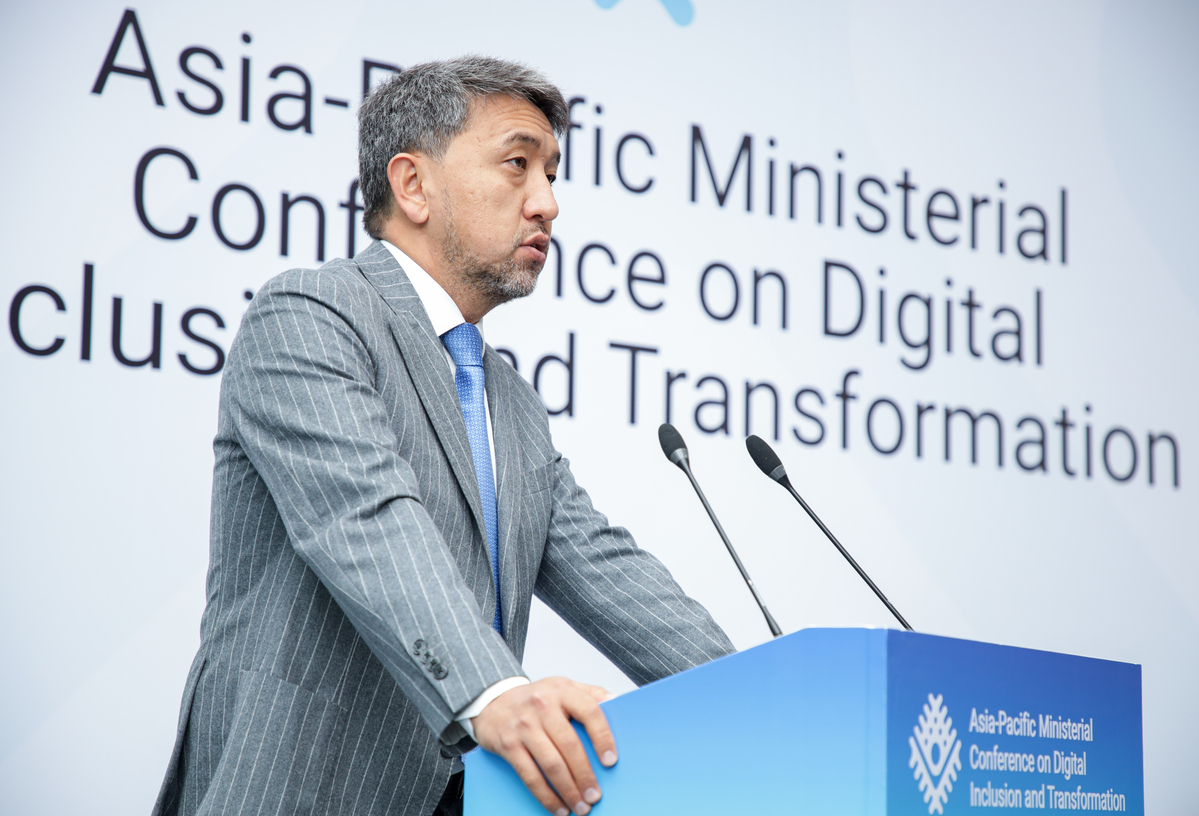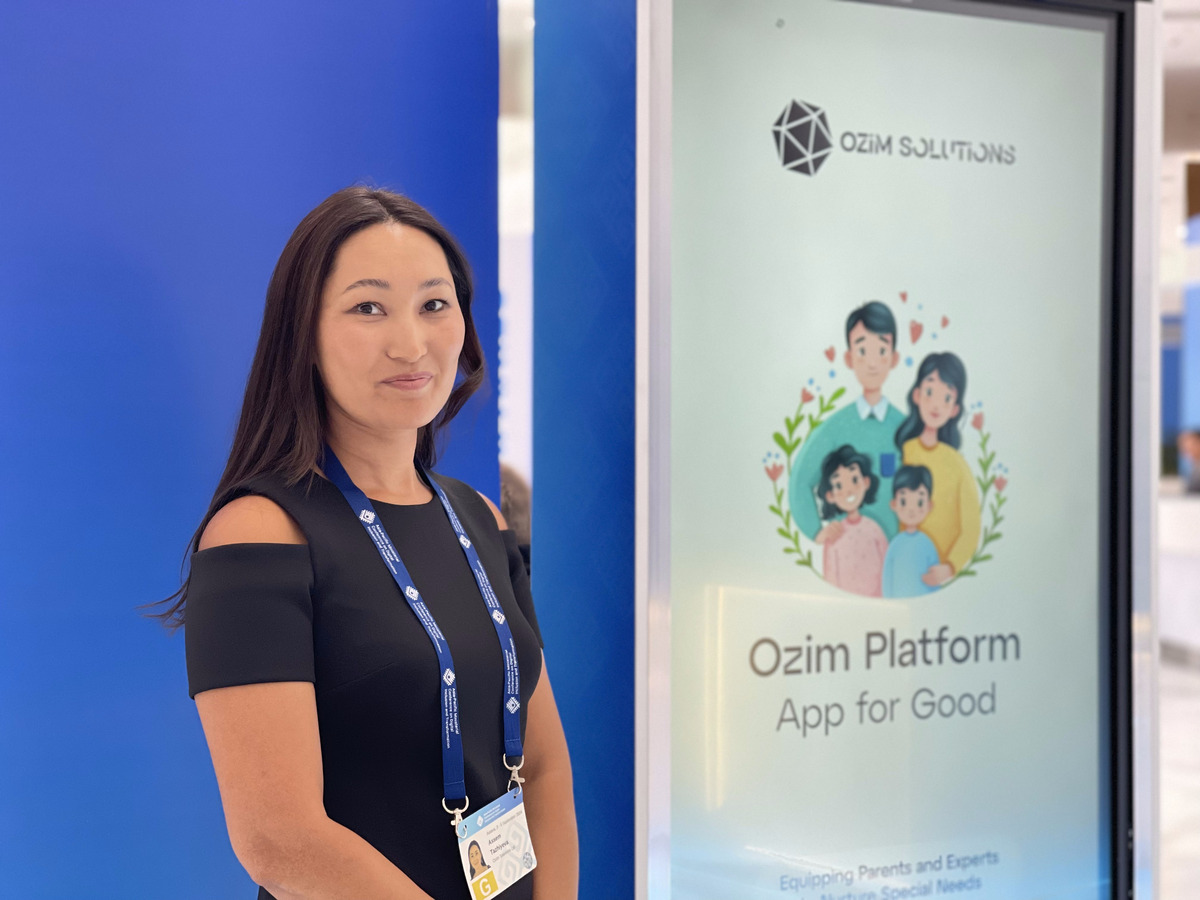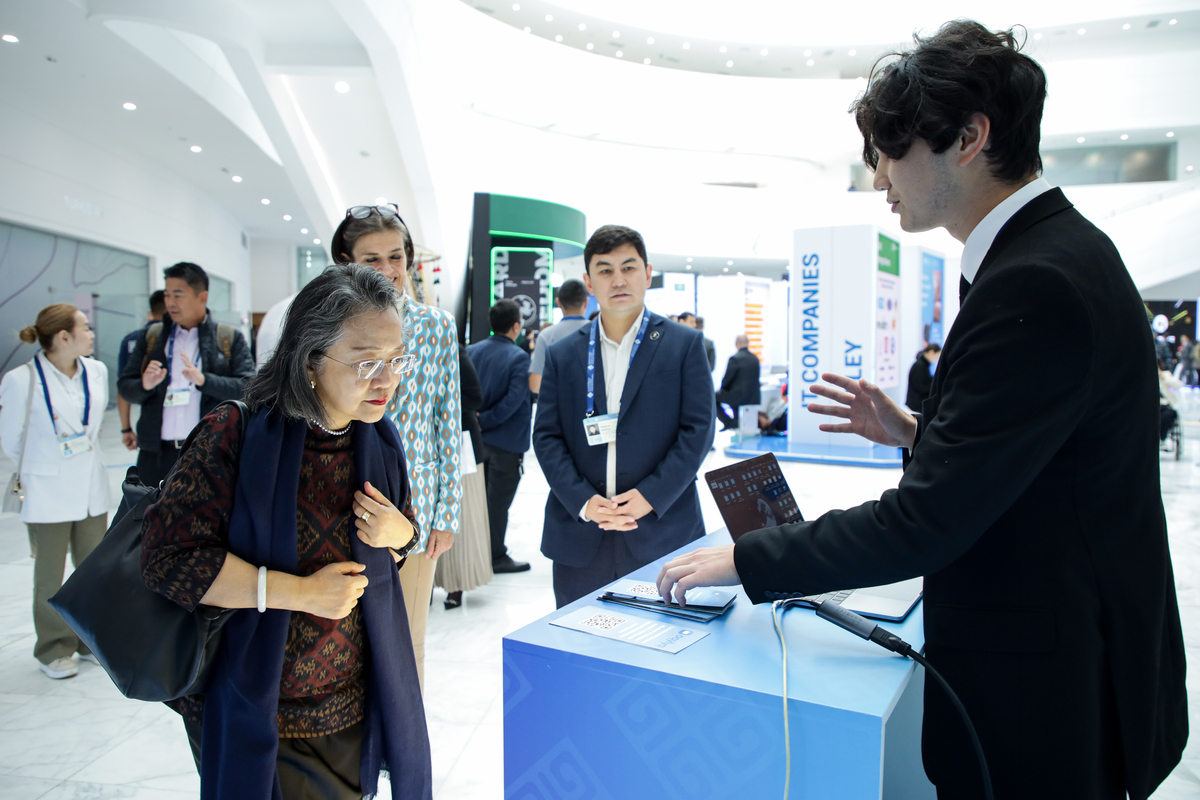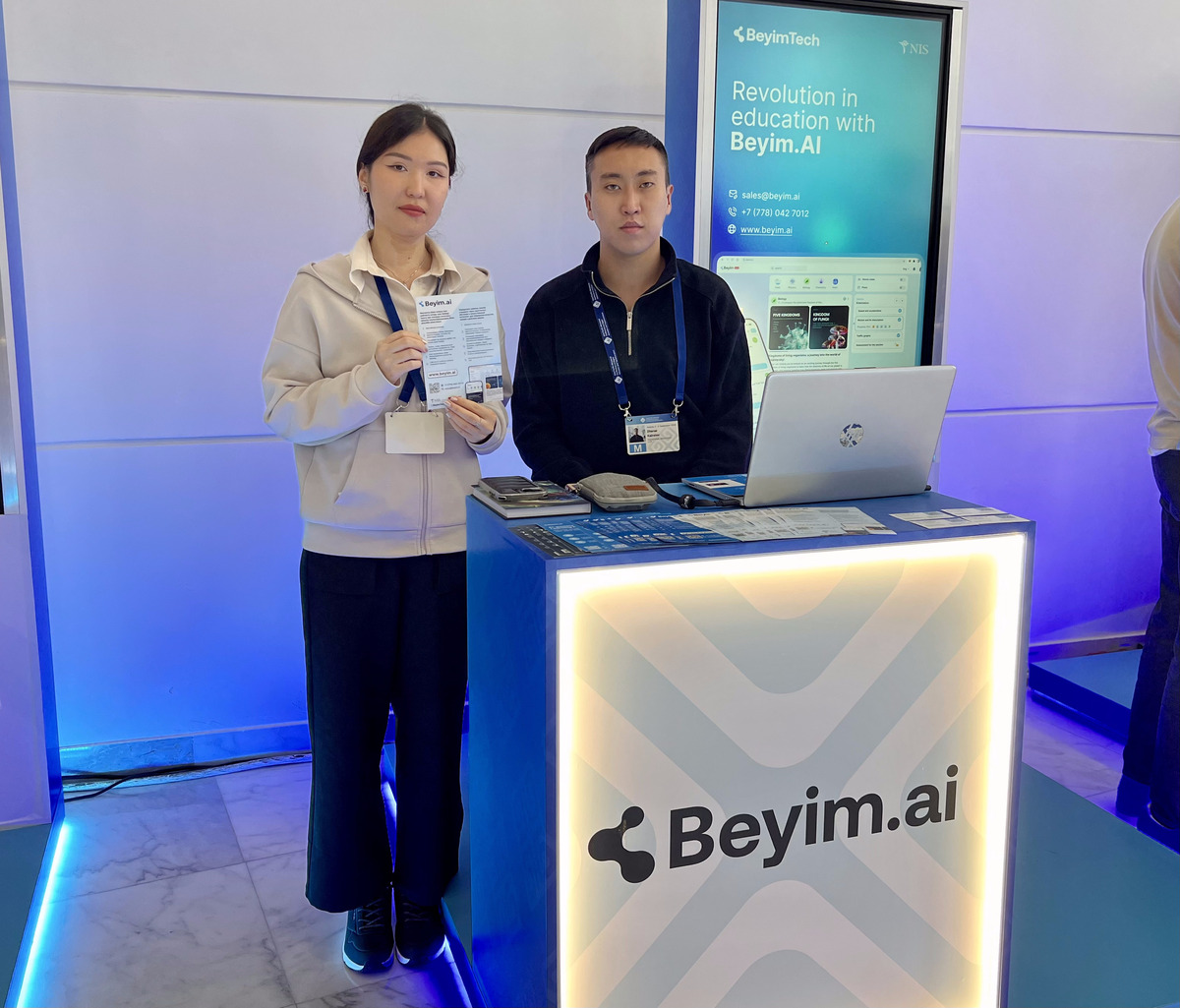ASTANA — The Kazakhstan Tech Solution Day, held as part of the Asia-Pacific Ministerial Conference on Digital Inclusion and Transformation, showcased the nation’s top startups and tech companies, highlighting Kazakhstan’s growing role in digital transformation on Sept.5.

Kanysh Tuleushin, the vice minister of Digital Development, Innovations and Aerospace Industry. Photo credit: ESCAP’s press service / Assem Garifulla
Organized by the international technology park Astana Hub, the event featured a range of panel sessions and more than 50 leading enterprises with cutting-edge solutions in environmental technologies, smart homes, educational platforms, security systems, digital health, data analytics, e-commerce, biometric technologies, mobile applications and energy management.
Kanysh Tuleushin, the vice minister of Digital Development, Innovations and Aerospace Industry, outlined Kazakhstan’s five-year AI strategy, focusing on AI infrastructure, human capital development, startup community growth and regulation. “This initiative includes a nationwide campaign to attract talent and foster research,” said Tuleushin.
The program also included signing memorandums and agreements on launching programming schools, advancing AI methods, developing regional tech hubs and other initiatives.
“The startups and companies featured at Kazakhstan Tech Solution Day not only showcase a high level of innovation but also significantly enhance quality of life and support sustainable development. They are poised to be key players in the digital transformation process both in Kazakhstan and internationally,” said Magzhan Madiyev, CEO of Astana Hub.
Alaqan: Palm biometrics
One standout innovation of the exhibition is Alaqan, a solution for biometric identification that uses palm vein patterns. The concept is based on a sensor that scans palms using the infrared range and records the vein pattern in a database.

Alaqan representatives. Photo credit: The Astana Times / Nagima Abuova
“The infrared rays are calibrated to a specific spectrum that is absorbed by hemoglobin, enabling the scanner to detect a unique vein pattern in the palm,” explained Bauyrhan Batyrbalinov, Alaqan’s product designer.
The team noted the system’s advantages, which ensure privacy and protection compared to other biometric methods such as facial recognition or fingerprinting.
“Unlike facial recognition, which surveillance cameras can capture without permission, or fingerprints, which can be collected from public surfaces, vein patterns are far more secure,” explained the team.
They are only detectable using infrared technology and can only be accessed with the individual’s consent, ensuring that this sensitive data is kept encoded and remains private and protected.
“The system is incredibly fast, recognizing individuals in less than a second,” said Meiram Kamelov, Alaqan’s project manager.
Alaqan offers two products, Alaqan Pay and Alaqan Mektep (school), with retail, education, and even school meal-tracking applications. The system is used in 140 schools across Kazakhstan and has expansion plans in Georgia and Türkiye.
“Alaqan Pay has already been introduced in some coffee shops in Astana, where customers can link their card and make purchases by scanning their palm, as well as Alaqan Mektep, the technology enabling real-time notifications for parents when their child arrives and leaves the school,” said Kamelov.
Ozim: Supporting parents of children with special needs
The Ozim (Myself) platform is a mobile application that provides information and methodological support to parents and guardians of children with special needs. It includes video instructions from qualified Kazakh experts and rehabilitation techniques that parents can use at home.

Assem Tazhiyeva, the Ozim platform’s founder. Photo credit: The Astana Times / Aruzhan Ualikhanova
Assem Tazhiyeva, the platform’s founder, noted that based on their research conducted in 2021 and 2023, over 60% of parents struggle to find trustworthy information and 24% turn to unreliable sources such as social media chats and blogs. Thus, the app offers a comprehensive platform featuring nine sections of curated content, including games, video lessons, and expert advice, tailored to fit into parents’ busy schedules.
Ozim has gained international recognition as a UN Digital Public Good (DPG) and partners with organizations such as UNICEF, UN Women and the World Health Organization (WHO).
With recent exposure to international delegates, Tazhiyeva noted that the team is currently focused on expanding partnerships and scaling its solutions beyond Central Asia to reach a global audience.
Oqylyq.kz – E-learning, knowledge verification, automated proctoring
Oqylyq.kz is an e-learning platform that uses biometric ID verification and automated proctoring technology to ensure a fair and transparent testing process. Since its launch in 2018, Oqylyq.kz has conducted over three million educational events and at least 250,000 exams.

Nurali Sarbakysh, deputy general director of the Oqylyq.kz, presents the innovation to Armida Salsiah Alisjahbana, Deputy Secretary General of the United Nations and Executive Secretary of ESCAP. Photo credit: ESCAP’s press service / Assem Garifulla
Nurali Sarbakysh, deputy general director of the Oqylyq.kz, shared that the global move to online education and examinations created new challenges for educational institutions and a need for a comprehensive system to control and prevent cheating and corruption attempts.
“The platform is popular among universities and human resources departments for its efficiency in screening candidates. By using our system, employers can test and evaluate a large number of applicants quickly and accurately,” said Sarbakysh.
The safeguards involve detecting second monitors, unauthorized persons, remote control attempts, and USB devices. The system also analyzes network activity and running processes, blocks prohibited apps, enforces full-screen mode, prevents copying and pasting, and calculates a trust index.
“In addition to recruitment, our platform is valuable for industries like mining, where regular technical safety testing is crucial. It helps to ensure that workers, even experienced ones, remain up-to-date with safety standards and provides digital certificates with QR codes to verify test results,” said Sarbakysh.
The team provides services to Kazakhstan’s leading educational institutions, the Daryn Republican Scientific and Practical Center, Regional centers for the identification and support of gifted children and talented youth in the Almaty, Shymkent, Mangistau, Karaganda and Zhetysu regions and other organizations.
Beyim.ai – online education platform
BeyimTech is a subsidiary of the Nazarbayev Intellectual Schools that has collaborated with the University of Arizona to develop an AI-based personalized micro-learning platform for students and teachers.
Its offerings include products, including Beyim Synaq (test), a platform to prepare students up to sixth grade to get into Nazarbayev Intellectual Schools, and Beyim.ai, which supports students from seventh to twelfth grade with tailor-made learning experiences.

BeyimTech representatives at the Kazakhstan Tech Solutions Day on Sept.5. Photo credit: The Astana Times / Nagima Abuova
“We want all schools to be equal so that every student and every teacher has the opportunity for additional education, access to resources, and the ability to see, predict, and keep up,” said Zhanat Kairatov, BeyimTech representative.
The platform also allows teachers to monitor student progress and identify areas where additional support is needed. Teachers can use the system to predict risks and focus on students who need more support, ensuring they receive the necessary assistance.
Relog – delivery operations optimization
Relog is a startup that offers logistics solutions through a route optimization system. It offers comprehensive statistics and delivery analysis, helping companies reduce costs by up to 50% and decreasing the car fleet by up to 20%.
Relog’s COO, Mukhtar Leker, shared that the company is now focused on scaling to new markets, particularly in the CIS region and English-speaking countries, where it aims to become the top logistics solution.
“We are not just providing a program. We ensure that our clients see value, whether it is in optimization or cost savings. Other companies provide software, but we ensure that it delivers real results,” said Leker.
